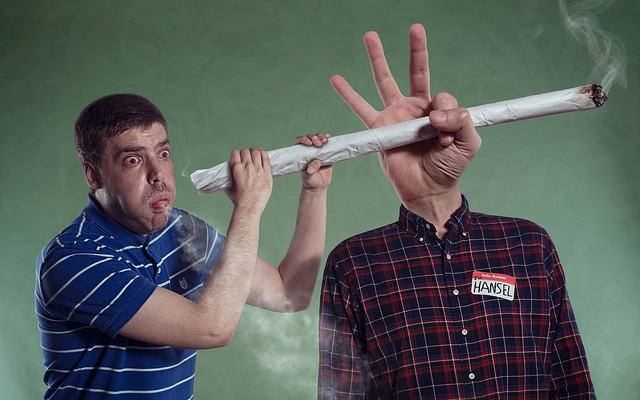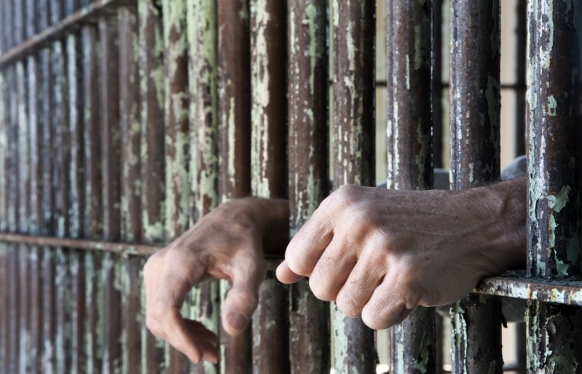This year, the Romanian drug law was amended in the direction of decriminalisation, though the law still retains imprisonment and fines as an option, while penalties generally discriminate against the poor and socially disadvantaged.
You probably didn’t know – even most Romanian don’t – but the days when a drug user could be convicted for up to 3 years in jail just for a joint, or between 2 and 5 years for a dose of heroin, are gone. At the same time, dealers were facing dreary sentences between 10 and 20 years, or between 15 and 25 years in prison for international trafficking.
 This has been the case until recently, but things changed significantly with the new Penal Code introduced in February 2014. With a little luck, drug users can now get away with paying a fine or doing community service. While the law states that the penalty for possession of drugs for personal use is between 3 months' and 2 years' imprisonment or a fine, community service can replace or accompany either the fine or the jail sentence. The fine is not a mere civil penalty, but constitutes criminal punishment and therefore comes with a criminal record. However, quite often the police look the other way when minor drug use is involved, or even small scale trafficking, such as a few marijuana cigarettes, a few doses of heroin, or unknown substances in little plastic bags; or they deal with users by fining them for civil offences, such as disturbing the peace, which users readily accept instead of harsher criminal penalties. As for community service, it is usually conducted in the domain of public sanitation, snow-clearance, park maintenance, helping the elderly, or environment protection. Work is restricted to eight hours a day, and can only be done during the daytime on working days. The old code also mentioned community service, but only as a paid-for option for inmates or in the case of serving a penalty at the working place. Now, Article 64 of the Code reads as follows:
This has been the case until recently, but things changed significantly with the new Penal Code introduced in February 2014. With a little luck, drug users can now get away with paying a fine or doing community service. While the law states that the penalty for possession of drugs for personal use is between 3 months' and 2 years' imprisonment or a fine, community service can replace or accompany either the fine or the jail sentence. The fine is not a mere civil penalty, but constitutes criminal punishment and therefore comes with a criminal record. However, quite often the police look the other way when minor drug use is involved, or even small scale trafficking, such as a few marijuana cigarettes, a few doses of heroin, or unknown substances in little plastic bags; or they deal with users by fining them for civil offences, such as disturbing the peace, which users readily accept instead of harsher criminal penalties. As for community service, it is usually conducted in the domain of public sanitation, snow-clearance, park maintenance, helping the elderly, or environment protection. Work is restricted to eight hours a day, and can only be done during the daytime on working days. The old code also mentioned community service, but only as a paid-for option for inmates or in the case of serving a penalty at the working place. Now, Article 64 of the Code reads as follows:
"(1) When the penalty of a fine cannot be executed in its entirety or in part, due to reasons not imputable to the convicted person, with his or her consent, the court shall replace the obligation to pay the rest of the fine with the obligation of working for the benefit of the community, except for when, due to health reasons, the person cannot perform such service. A day of community service corresponds to each day-fine.
(2) If the fine substituted under paragraph (1) accompanies a jail sentence, the penalty of community service is to be fulfilled after serving the jail sentence.”
Decriminalization, a win-win
A non-governmental organisation, The Foundation for Promoting Community Service, runs a workshop for dismantling electronics near Bucharest and two others in the country, modelled on a Swiss program, where one can often find convicted drug users. It was considered that working for the benefit of the community also has benefits for the convicted criminal, since community service could make them more responsible, while building some practical skills and raising their self-esteem. At the same time, somewhere in the background there probably lurked the opposite idea – that being seen doing community service makes one ashamed, and that young people puffing marijuana might get a grip on reality.
Overall, we are still far from the situation in Portugal or the Czech Republic, where drug use has been decriminalised, but we are slowly and hesitantly moving away from legislation which criminalises and drastically penalises consumers.
Here is how the penalties have changed for a few of the main drug-related criminal offences covered by Law No. 143 from 2000, and amended by a law from 2009 which came into effect with the new Penal Code this year:
|
Criminal Offence |
Penalty according to Law No. 143 from the year 2000
|
The Penalty according to the Penal Code from 2014 |
|
Producing, owning or buying drugs in the first category of risk1 for personal use
|
Between 6 months and 2 years in jail or a fine (the penalty used to be between 2 and 5 years in jail, it was reduced in 2004)
|
Between 3 months and 2 years in jail |
|
Producing, owning or buying drugs in the second category of risk for personal use
|
Between 2 and 5 years in prison |
Between 6 months and 3 years in jail |
|
Producing and trafficking drugs in the first category of risk
|
Between 3 and 15 years in prison |
Between 2 and 7 years in prison |
|
Producing and trafficking drugs in the second category of risk
|
Between 15 and 25 years in prison |
Between 7 and 15 years in prison |
|
Importing and exporting drugs in the first category of risk
|
Between 10 and 20 years in prison |
Between 3 and 12 years in prison |
|
Importing and exporting drugs in the second category of risk
|
Between 10 and 20 years in prison |
Between 5 and 10 years in prison |
|
Offering to host or allowing drug use in a public location
|
Between 3 and 10 years in prison |
Between 2 and 7 years in prison |
|
Urging someone to use if it is not followed by actual use
|
Between 6 month and 2 years in prison |
Between 6 month and 3 years in prison |
|
Urging someone to use drugs if it is followed by actual use
|
Between 6 month and 5 years in prison |
Between 6 month and 3 years in prison |
|
Organising and financing the production and trafficking of drugs in the first category of risk
|
Between 6 and 18 years in prison |
Between 5 and 10 years in prison |
|
Organising and financing the production and trafficking of drugs in the second category of risk |
Between 18 and 28 years in prison |
Between 10 and 18 years in prison |
Discriminatory drug law
Articles 81 and 83 of the code establish when the penalties can be suspended (if the sentence does not exceed 5 years) or suspended (if the penalty does not exceed 2 years), such as the context and the gravity of the crime (drug quantity is usually the main factor considered), the absence of prior convictions, the general demeanour of the defendant and the opportunities he has for rehabilitation, and whether he/she has obstructed or helped the investigation, or attempted to avoid it.
Often, the judge also takes into consideration whether the accused has a family, references from members of the community, and whether the user is capable of work for a living, as criteria for suspending or reducing a sentence – which seems quite odd: Why should users who have no family, or who are unable to work, deserve more jail time?
 The judge can also suspend the sentence if he/she considers that it would have a detrimental effect on the user and the community, which sounds good in theory, but in practice it can mean that people from poor families or from an underprivileged background can once again be at a disadvantage, while users from better off families get away with only a warning.
The judge can also suspend the sentence if he/she considers that it would have a detrimental effect on the user and the community, which sounds good in theory, but in practice it can mean that people from poor families or from an underprivileged background can once again be at a disadvantage, while users from better off families get away with only a warning.
The updated version of Law No. 143/2000 also stipulates that drugs users have to be included in the national system of addiction treatment services, and if the user follows the treatment protocol, the court may decide to drop the sentence or suspend it. In practice, this means mandatory treatment for people with addictions, with substitution treatment for heroin users, psychotherapy and rehabilitation treatment. This piece of legislation is an application of the concept of “therapeutic justice”, as recommended by the European Union.
When the penalty is suspended by the court, the convicted person has to make regular visits to the probation service, receive visits from a probation officer, and inform the authorities of any change of residence or employment. The decision to suspend the penalty can also be accompanied by between 30 and 60 days' community service. Sometimes conflicting limits are stipulated by different articles and laws, which is why one needs a competent lawyer to corroborate all relevant legislation and to argue for the minimum sentence possible under the law.
As for the level of fine one might pay for buying or possessing drugs for personal use, the new Penal Code establishes the amount in “fine-days” decided by the judge. For this offence, the judge can impose a fine of between 60 and 240 fine-days, valued at between (approximately) 2.5 and 12 euro each. By multiplying the two, we get a limit of between 150 and 2880 euro. The same criteria of gravity and potential of rehabilitation apply for the limits of the fine, as for the limits of prison time. When the convicted person, that is the user, does not have the financial means to pay the fine, the court can order that it be paid in monthly instalments, or that fine-days shall be converted into days of community service. As a Romanian comedian says in one of his sketches “No fucking way I’m paying that much for a bit of drugs”.
Doing a sixteen on someone
I asked Valentin Simionov, director of the Romanian Harm Reduction Network and an anti-prohibition activist, what he thinks about the recent change in legislation, and he told me, “A reduction in the penalties for the possession of drugs for personal use is welcome, although this policy was not based on an official feasibility study or an evaluation of national drug policy. The main reason why it’s still welcome is that it introduces a clearer distinction between the drug user and the person who sells drugs for profit. The reduction of the penalties is an intermediary step to the decriminalisation of possession of drugs for personal use, which will allow drug users to access medical and social services when they need them, without the fear that they might have to suffer any legal consequences, so long as their personal use does not impact public safety”.
 The law which deals with illegal drugs used to feature a rather famous little article, number 16, which gave rise to the expression, common among heroin users, “doing a sixteen on someone”, which meant organising a drug transaction supervised by the police, in order for some other dealer or user to be caught in the act, while the person “doing the sixteen” could legally walk away. In the new code, the same article has been renumbered as 15. Otherwise the text is identical:
The law which deals with illegal drugs used to feature a rather famous little article, number 16, which gave rise to the expression, common among heroin users, “doing a sixteen on someone”, which meant organising a drug transaction supervised by the police, in order for some other dealer or user to be caught in the act, while the person “doing the sixteen” could legally walk away. In the new code, the same article has been renumbered as 15. Otherwise the text is identical:
“A person who commits one of the crimes specified by articles 2 to 9, and while being under penal investigation denounces and facilitates the identification and the legal charge of other people who have committed drug-related crimes, will benefit from a halving of the sentence specified by the law”.
So, weary drugs users need not despair – they can still rat on their friends to get away on the cheap from an unpleasant drug charge, only now they will have to say that they “did a fifteen” to their friends and drug pals.
There’s one more interesting little article, number 25, which states that:
“Anyone who knows about a drug user can inform one of the medical institutions established by the Health Ministry, which will proceed according to the law”.
Ștefan Iancu
This article was originally published in the Romanian edition of Vice Magazine





